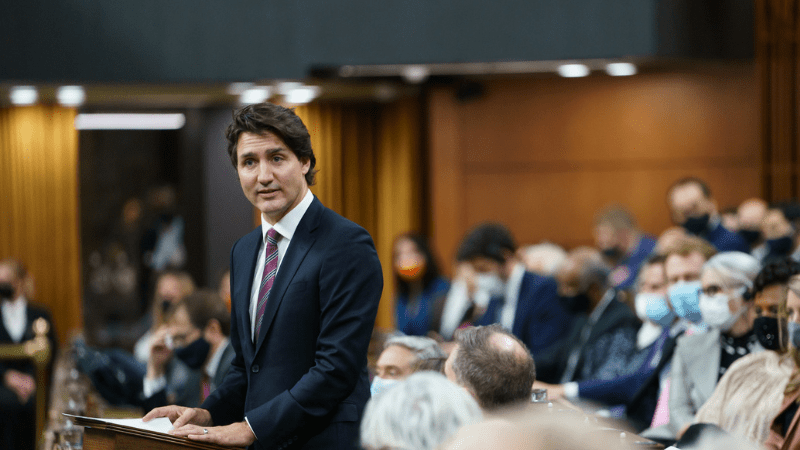This article originally appeared in the Epoch Times.
By Peter Menzies, March 4, 2024
The Online Harms Act, in all its ominous incarnations, was always going to be all about saving the children.
Except it was never just about that. It was really always about what has been revealed to be its core purpose: suppressing Canadians’ freedom of speech on the internet. The saving the children from exploitation by online predators part is just political exploitation. Either you agree with the bill entirely, its proponents will say, or you don’t want children protected.
Too cynical? If only that were the case. When I wrote about this immediately following the tabling of this legislation on Feb. 26, one commenter pointed out—rightly—that I hadn’t covered all the truly extreme steps Justice Minister Arif Virani had taken with this legislation, which is enormous in both length and complexity. I don’t like to rush to judgment. I don’t like to be wrong and, frankly, some of the provisions were so bizarre they were difficult to believe without affirmation from legal experts.
But affirmed they have been. So here we go.
Online Harms, a.k.a. Bill C-63, will actually make it possible in Canada for you to be placed under house arrest for something the police think you might be thinking about saying online.
That’s right. The bill makes prior restraint possible when it comes to speech, giving anyone who “reasonably fears” you are about to post hateful content the ability to obtain a peace bond restraining you from doing so and confining you to your home. Yes, you’d have to get a judge to make the order, and yes, the attorney general would have to sign off, but what was once unimaginable in a modern liberal democracy not at war is about to become stark reality in Prime Minister Justin Trudeau’s post-national Canada.
It is not at all inconceivable that had this law existed when the Freedom Convoy occupied downtown Ottawa, it would have been put to use.
You will also soon be subject to being sentenced, under C-63’s revisions to the Criminal Code, to life in prison for something you say online. Yes, advocating or promoting genocide is a hideous and repellent thing to do, but it is very different from committing genocide or even inciting it.
There are those within the current political climate, for instance, who consider pro-Palestinian chants of “from the river to the sea” to be calling for the genocide of Israelis. Highly reprehensible if that is the case, but life in prison? This is madness.
The Canadian Civil Liberties Association (CCLA) is aghast.
“The broad criminal prohibitions on speech in the bill risk stifling public discourse and criminalizing political activism,” the CCLA said in a statement.
“The bill imposes draconian penalties for certain types of expression, including life imprisonment for a very broad and vaguely defined offence of ‘incitement to genocide’, and 5 years of jail time for other broadly defined speech acts. This not only chills free speech but also undermines the principles of proportionality and fairness in our legal system. Bill C-63 also creates a new offence (‘offence motivated by hatred’) that risks misuse or overuse by police, and unfairness to accused persons in court.”
In establishing an Online Safety Commission with what appear to be almost limitless powers, Virani has set the stage for that body to expand both its turf and its authority, a pair of behaviours to which public servants are notoriously inclined.
The CCLA said C-63 allows government appointees “vast authority” to “interpret the law, make up new rules, enforce them and then serve as judge jury and executioner.”
If that isn’t enough to alarm you, the new Digital Safety Commission will be free to search electronic data without fussing with a warrant and otherwise violate citizens’ digital privacy.
None of this is acceptable.
Nor is the exploitation of children online by various creeps and charlatans luring them via Facebook or other platforms.
Meta chairman Mark Zuckerberg and other tech executives were taken to the virtual woodshed by the U.S. Senate Judiciary Committee just weeks ago for not doing more to safeguard children.
Zuckerberg went so far as to stand up and publicly apologize.
“It’s terrible. No one should have to go through the things that your families have suffered,“ he told families of victims. ”And this is why we invest so much and are going to continue doing industry-leading efforts to make sure that no one has to go through the things your families have had to suffer.”
Whether that will mitigate the damages from lawsuits remains to be seen, but it clearly makes the point that Canadians are not wrong to be concerned about the online safety of their children.
So, as previously noted, the provisions in the Online Harms Act to impose duties of care on social media companies and establish oversight of them concerning the safety of children are entirely appropriate. They are in fact in alignment with what I called for two years ago in a paper for the Macdonald-Laurier Institute.
But this government couldn’t stop there. Quite despicably, it has built a Trojan horse from children’s safety and stuffed it with an overwrought assault on its citizens’ most basic freedoms.
Which is why Bill C-63 must be dismantled or defeated.
Peter Menzies is a senior fellow with the Macdonald-Laurier Institute, an award winning journalist, and former vice-chair of the CRTC.






